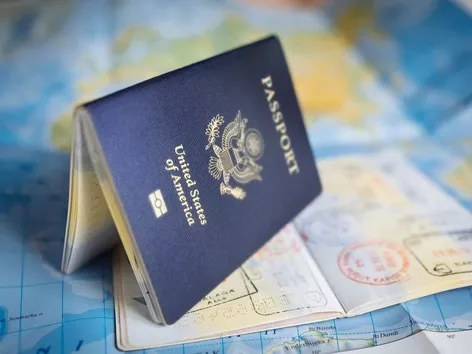Countries which offer birthright citizenship: basic rules and requirements
Table of contents
- Citizenship by "birthright" ("jus soli") without additional requirements
- Citizenship by "birthright" ("jus soli") subject to fulfillment of requirements
- Citizenship by "right of blood" ("jus sanguinis")
- Giving birth abroad to obtain citizenship in 2024
- Top 5 countries that are considered the best for giving birth

Not all countries grant citizenship to children born on their territory. In some states, it is necessary to fulfill a number of requirements, while others do not offer such an option at all. Find out which countries offer birthright citizenship
Usually, newborn children receive citizenship either by the "right of blood" ("jus sanguinis") - it depends on the citizenship of the parents, or by the "right of the land" ("jus soli") - depending on the country of birth. In the second case, the state immediately grants citizenship to all newborns, regardless of the citizenship of the parents. However, sometimes it is necessary to fulfill a number of additional requirements beforehand.
In total, citizenship based on the place of birth is issued in more than 64 countries of the world. However, in most of these states, a number of additional requirements must be met.
We talk about the peculiarities of acquiring citizenship based on the place of birth below.
Citizenship by "birthright" ("jus soli") without additional requirements
When issuing citizenship by "birth right", it is necessary to take into account the nuances and requirements in the legislation of each country. Without any additional requirements, all children born can obtain citizenship in the following countries:
Antigua and Barbuda, Argentina, Barbados, Belize, Bolivia, Brazil, Canada, Chad, Costa Rica, Cuba, Dominica, Ecuador, El Salvador, Fiji, Grenada, Guatemala, Guyana, Honduras, Jamaica, Lesotho, Mexico, Nicaragua, Panama, Paraguay, Peru, Saint Kitts and Nevis, Saint Lucia, Saint Vincent and the Grenadines, Tanzania, Trinidad and Tobago, Tuvalu, USA, Uruguay and Venezuela
Interestingly, almost every nation that offers birthright citizenship is located in North or South America. Many scholars believe that it began in colonial times, when European countries, seeking to settle their settlements in the "New World", introduced softer and more favorable citizenship policies for immigration.
Rules for obtaining citizenship "by birthright" in the countries of North and South America
- In the USA, all children who were born in the country receive citizenship without any additional requirements. Based on the certificate from the maternity hospital, the child receives a birth certificate, and later a passport. When the child turns 21, he will be able to obtain citizenship for his parents - on the basis of family reunification.
- Canada also grants citizenship to all children who were born on the territory of the country. To get a passport, you only need a birth certificate and an application.
- All children born in the country receive Mexican citizenship. On the basis of the birth of a child, parents can also obtain Mexican citizenship. To do this, it is necessary to live in the country for at least 2 years and to pass an exam in the Spanish language and the history of the state.
- Practically all countries of South America grant the citizenship of their state to a child immediately at birth. The only exception is Colombia, where at least one of the parents must have a residence permit at the time of the child's birth. But Peru grants citizenship to a child upon reaching the child's 18th birthday.
- Children born on the territory of the Caribbean countries automatically become citizens of the state. Citizenship of these countries has a number of advantages: visa-free travel to the countries of the Schengen zone and Great Britain, the possibility of obtaining a tourist visa in the USA for 10 years, benefits for admission to universities in Great Britain.
In order to safely move, travel or work in a new country, you will need health insurance. You can issue an extended policy on our website using the link.
Citizenship by "birthright" ("jus soli") subject to fulfillment of requirements
In addition to the countries listed above, under certain circumstances states may also offer birthright citizenship.
Asian countries
- Azerbaijan - the child must be born in the country to unknown or stateless parents
- Bahrain – the father must be born in Bahrain or have a residence permit in the country at the time of the child's birth
- Israel - a child born in a country that has not received another citizenship can apply for Israeli citizenship between the ages of 18 and 21. Passports are issued only to those who have lived in Israel for at least five years before applying for citizenship.
- Iran - at least one parent must be born in Iran.
- Cambodia – parents must reside in the country legally; for example, have a residence permit.
- Malaysia - at least one parent must be a permanent resident of the country.
- Mongolia - only when the parents are unknown or have a residence permit in the country. A passport is not issued until the child reaches 16 years of age
- Thailand - parents must legally reside in the country for five years prior to the birth of the child.
- Taiwan - only when parents are unknown or stateless.
Africa
- Guinea-Bissau - the child must be born in the country of unknown parents.
- Egypt - at least one parent must be born in Egypt.
- Morocco - parents must have been born in Morocco and legally immigrated to another country. A Moroccan passport can be obtained no earlier than two years before reaching the age of majority.
- Namibia – at least one parent must be a resident of Namibia.
- Tanzania - automatically, except for children of diplomats.
- Tunisia - if the child's father or grandfather was also born in Tunisia, they can get a passport until they are 20 years old.
- Chad - when the child turns 18 years old.
- South Africa - parents must permanently reside in the country.
Australia and Oceania
- In Australia, citizenship can be obtained by a child who was born and lived in the country for the first 10 years.
- In Tuvalu and Fiji, citizenship is granted to all newborn children.
Europe
- Great Britain - a child receives citizenship at the age of 10. Citizenship is granted at birth only if at least one of the parents has permanent residence in the country.
- Germany - at least one of the parents must have a permanent residence for three years and have lived in the country for at least eight years before the birth of the child.
- Greece – if the parents are unknown or have lived in the country for at least five years before the birth of the child.
- Ireland – parents must be domiciled in the country or Northern Ireland or legally resident in the country for at least four years before the birth of the child.
- Spain - if at least 6 of the parents were born in Spain or if neither parent can transfer their citizenship to the child.
- Luxembourg – at least one of the parents was born in Luxembourg, even if they are not citizens of Luxembourg; both parents are stateless or cannot transfer their citizenship to the child; parents unknown; a child born to foreign citizens will receive citizenship at the age of 18 under the conditions of residence.
- Malta - if at least one of the parents was born in Malta. Applies to children born after August 1, 2001.
- Portugal – if at least 6 one of the parents has lived in the country for at least a year on the basis of a residence permit.
- France - at least one parent must be born in France. If both parents are foreigners, the child can get citizenship from the age of 13, provided they live in the country.
Citizenship by "right of blood" ("jus sanguinis")
A child inherits citizenship by right of blood from his parents. If the parents are citizens of different countries, they can choose the citizenship of their child, if the legislation of that country allows it.
When citizenship is inherited, the gender of one of the parents is sometimes taken into account. For example, only a child whose father is a UAE citizen can become an OAE citizen by birth. Children born in a family where only the mother is a citizen of the UAE can obtain the citizenship of the country through naturalization.
Citizenship can also be passed from generation to generation to grandchildren and even great-grandchildren. In this case, when applying for citizenship, the child must confirm the kinship and citizenship of the chosen country of his ancestors.
Giving birth abroad to obtain citizenship in 2024
Various agencies specialize in organizing and accompanying births in the US and Canada for foreign mothers. These countries have become popular destinations for "birthing tourism" because of their policies on granting citizenship to newborns. The services of such agencies include visa support, accommodation search, document processing, selection of clinics and doctors, as well as full logistical support.
For example, in Canada, foreign mothers usually arrive at 4-5 months of pregnancy and stay in special hotels for childbirth. They use free medical care and can receive help from the state.
The birth procedure is paid: the standard price is about 10,000 dollars for the birth, plus the costs of accommodation and agency services. Choosing Canada or the US, although not the cheapest, provides a reliable path to citizenship in a developed country. Being born in another country can make sense even without the goal of obtaining a passport, as a way to ensure quality medical care for yourself and your child.
Top 5 countries that are considered the best for giving birth
1. Finland - up to 7,000 euros;
2. Switzerland - from 20,000 euros;
3. Germany – 12,000 euros;
4. Austria – 7000-10000 euros;
5. France – 16,000-20,000 euros.
So, not every country offers citizenship by birth, and in some countries a number of requirements must be met to obtain the document. Therefore, before preparing for a trip, get the advice of a specialist.
We will remind you! Some countries allow their citizens to have 3 passports at once. This status provides many advantages, such as visa-free entry to more countries, access to social and economic rights in different states. We talked about the countries in which multiple citizenship is allowed earlier.
Igor Usyk - Head of Migration department at VisitWorld
To ensure a safe move to a new country, I advise you to consult a specialist. My colleagues, qualified specialists with a legal education, will help you avoid unpleasant situations during migration.
Products from Visit World for a comfortable trip:
Travel guide for 200 countries;
Legal advice from a local specialist on visa and migration issues;
Travel insurance around the world (please select the country of interest and citizenship to receive services);
Medical insurance all over the world.
Frequantly
asked questions
In which country is it best for foreigners to give birth?
Does France have citizenship by birth?
Are foreigners forbidden to give birth in the US?
Recommended articles
3 min
Employment
Lithuania work visa: types of work permits, the procedure for obtaining and a package of documents
Lithuania is a European country that is becoming increasingly popular among expats. Foreigners are attracted here by the booming economy and employment prospects. Find out what types of work visas are issued in Lithuania, the requirements and the procedure for obtaining them
31 Aug. 2024
More details2 min
Employment
In 2024, New Zealand introduced a number of important changes to visa and migration policies. Find out what these changes are, what categories of permits are affected by the innovation and who should be prepared for the new rules
04 Sep. 2024
More details3 min
Pros & Cons
Pros and cons of living in South Korea: what is important for expats to know?
Life in South Korea will provide expats with many opportunities, but it also comes at a price. When planning to move here, you should be prepared for certain advantages and disadvantages. Find out what are the pros and cons of living in South Korea and what to pay attention to when planning a move to the country
28 Dec. 2025
More details2 min
Travels
Japan plans to change visa-free travel rules for travelers from 71 countries by introducing a new travel authorization system. Find out when they plan to approve the new system, how entry rules will change and what requirements are relevant in 2024
05 Sep. 2024
More detailsAll materials and articles are owned by VisitWorld.Today and are protected by international intellectual property regulations. When using materials, approval from VisitWorld.Today is required.
